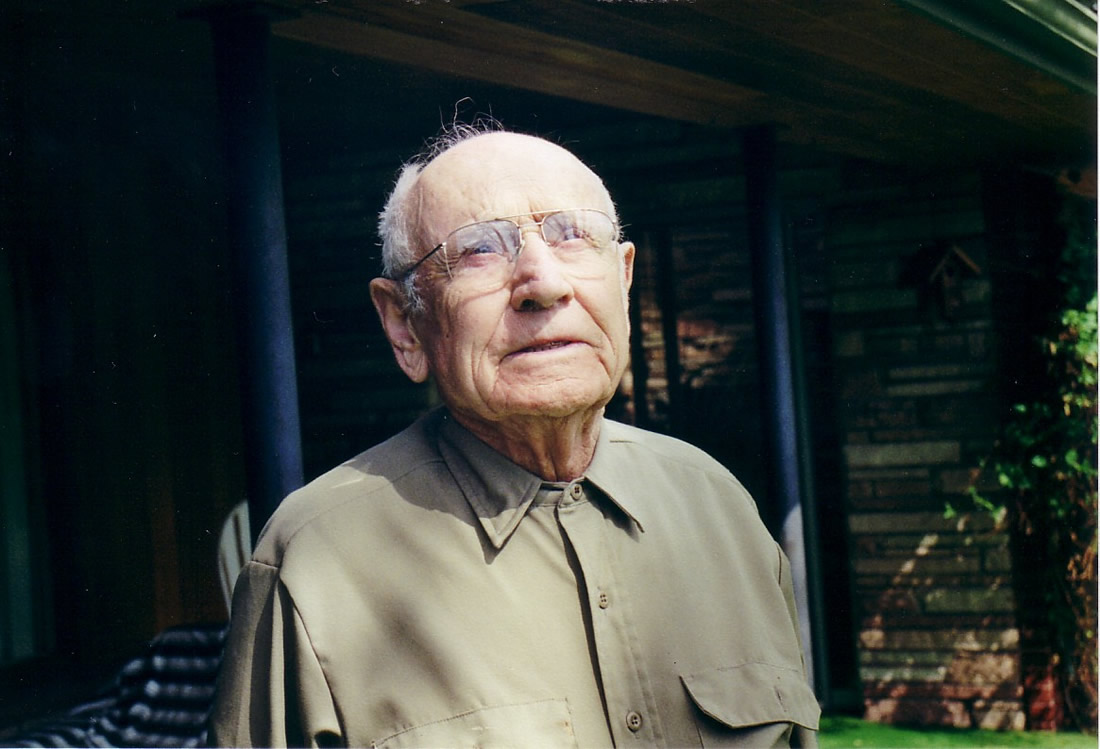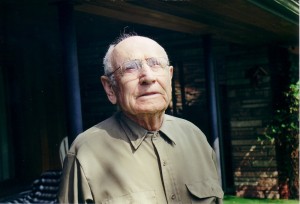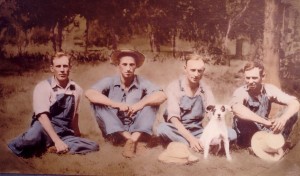By S. Clayton Moore
Cole Kugel is a man of two worlds. Born 100 years ago, he was a farmer for much of his life. He is also a pilot whose achievements include being listed in “Guinness World Records” as the world’s oldest qualified pilot.
“I got to do quite a bit more traveling than the average person,” said Kugel, describing a lifetime of memories in his usual humble manner, in his home at the top of a hill in Longmont, Colo. He has, as he says, seen America go from the “horse and buggy to the automobile” and from “biplanes to rocket ships.”
Kugel’s birthday was March 14; he celebrated with a party at his home with over 300 people in attendance. Because of the party as well as some foul weather, Kugel had to delay his annual tradition—a short flight—by one day. Instead, he flew the next day.
Accompanied by the grandson of a fellow pilot, Kugel piloted a 1976 Cessna 182, which he sold to a friend last year, across the sky above Platteville, Colo., to look down on the fields in which he worked for years. The plane still carries the call letters that Kugel gave it, Two-Nine Charlie Mike. Those letters really stand for Cole and Mildred, his wife who passed away last year.
“I just outlived them all. I guess I’m not wanted up there just yet,” said Kugel, who was born in 1902, less than a year before the Wright brothers tested their powered aircraft at Kitty Hawk, N.C.
Kugel was the middle child of five—the others are Harry, Paul, Glen and Mirth. Of those children, three of the brothers learned to fly.
John and Rose Kugel raised the children on a farm in Oklahoma.
“It’s a darned good place to grow up,” said Kugel. “That first farming was horse farming until about 1915. We ran a tractor one season before it wore out, and then we went back to horses.”
Eventually, Kugel attended college at Oklahoma A & M at Stillwater, where he completed a degree in commerce and marketing.
“I thought I knew a little about farming from practical experience. I thought, gee, I better learn a little bit about the business, too,” said Kugel. His three brothers attended the same university.
As a newly educated man, Kugel fell into school teaching when a local teacher walked out after the first month, leaving the superintendent in a pinch.
“He called and asked if I could substitute a few days for him until he could find another teacher. I guess he forgot about looking for another teacher because I taught there for a year and a half,” he said.
In the fall of 1926, he attended a gathering at the Methodist church in Lamont, Okla. As the teachers circled around, he stopped in front of 23-year-old Mildred Kemper, from Chickasha, Okla.
“I was looking over all the schoolteachers to see what I could find. When she came around, I squeezed her hand. She said that she always blamed me for that. She looked pretty good, so we got to going together,” said Kugel fondly. The two hit it off, sending him on a chase that would last 10 years. “We courted a long time, because there was a depression on, and there wasn’t any money to get married on.”
The Kugels finally tied the knot in 1936, with plans to spend their honeymoon in China, but a steamship strike kept them in San Francisco the whole time.
Just before the depression hit, Kugel started his other romance—flying. He had seen airplanes as a child at the county fairs near Blackwater, Okla. In the late twenties, he took to the sky for lessons in biplanes, and was able to accumulate 12 hours of solo flight. Then, the depression hit, and his flying days were over—for the time being.
Eventually, brothers Paul and Cole followed an uncle who had contracted tuberculosis to Longmont, Colo. Their uncle had arrived in 1929 seeking a “rest cure” after being given a prognosis of six months to live.
“He fooled them; we buried him in 1963,” said Kugel. His sister Mirth and her husband John Leonard followed the brothers to Longmont a few years later, where all prospered.
The brothers set up dry land farms in the fields of Platteville; a bumper crop in 1941 set them up pretty well. By 1944, Paul had his pilot’s license. Later, with Cole’s help, he assisted the city in building the first hangar and runway at what would become Longmont’s Vance Brand Airport.
That same year, a group of farmers back in Stillwater, the Kugel brothers’ old stomping ground, were organizing the group that eventually became the International Flying Farmers. Today, nearly 3,500 members use their aircraft to monitor irrigation systems, check livestock and crops, and especially to deliver and pick up supplies and parts.
“I don’t know whether the idea first came up down there, but that’s where they first organized. It spread like wildfire. We did whatever you could use an airplane for, to go places, and look the crops over. I didn’t quite get in on the first group only because I didn’t have a plane at the time,” said Kugel.
Kugel got his private pilot’s license in 1945. In the fall of 1946, he took a commercial flight to the Piper aircraft factory in Lock Haven, Penn., where a brand new Piper Super Cruiser awaited him. He waited a couple of days for the weather to clear, and then ferried the airplane back across America with no radio and only a set of standard road maps to guide him.
“It was a lot more free than it is today. You’d go where you wanted to go. Today you better be darned careful. It isn’t free flying like it used to be,” said Kugel. “I just headed west. I knew that was where I had to go.”
When the gas gauges got a little low, Kugel knew what to do.
“I saw the signs on the water tower in New Philadelphia, Ohio, and so that’s where I landed,” said Kugel. He refueled, and ate Thanksgiving dinner there on the airstrip. He followed the roads and railroad tracks across the Midwest. He skirted the city of St. Louis and made a stop in southeastern Missouri, then picked up Mildred in Oklahoma and headed home.
Back in Colorado, the Kugels became involved with the Longmont Flying Ranchers, a group that eventually became today’s Colorado Flying Farmers. Kugel was elected president of the group in 1955.
“It just comes to be your turn to do something. At that time, there were lots of members and places to go. It was a growing outfit,” said Kugel of his year as president. Through the Flying Farmers, the Kugels made friends with farmers all over the continent, as well as with local farmers.
“Cole Kugel is a nice guy to work with. He tries pretty hard,” said Delmar Lemons, who was vice president during Kugel’s term as president and was president of the organization twice. Lemons and his wife Clara got to know the Kugels during a train trip to a Colorado Flying Farmers convention in Grand Junction.
“He’s been an asset to us ever since,” Lemons said.
Clara Lemons was the Flying Farmers’ first queen back in 1941, and kept their history as the group’s secretary for over 14 years. She remembers Mildred’s insistence on always accompanying her husband.
“If that airplane left, she didn’t want it to go without her,” she said. Together, the Kugels saw North America, from Alaska to Costa Rica and everything in between, from the cockpit of their airplanes.
“We got as far west as where the Iditarod ends. That’s about as remote as you can get. You’re not too far from Russia,” said Kugel of one trip in the mid-fifties, during which 31 planes filled with Flying Farmers spent three weeks traveling to Alaska. Another favorite spot of his was East Trout Lake, a secluded fishing spot near Saskatchewan in Canada. For more than 20 years, the Kugels and several friends made annual trips to catch the big northern pike, walleye and lake trout that populated the lake.
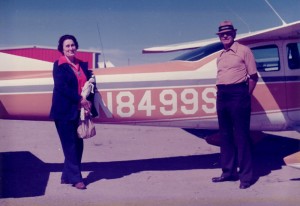
Cole and Mildred Kugel, in their traveling days, pose in front of 8499 Sugar, their 1965 Cessna 180.
“They finally got a road built and that messed up the fishing,” he said. “Those lakes will fish out pretty quick, because the fish don’t grow very fast in that cold water. We just kept moving a little further north until we finally got clear up to the northern edges of Saskatchewan.”
Mildred Kugel had no problem with the travails of flying. Even before her wedding, she had been to Europe with her sister, and to South America to visit relatives in Chile.
“She could fly through most any kind of weather and bounce around and go to sleep. She liked to fly. She took some lessons but never got to where she wanted to get a license. She made a landing or two, but that’s as far as she went with it,” said Kugel.
In 1963, Kugel built the home he lives in today, which sits on a plot of land he bought for $1,000. What was a cow pasture that year is now a handsome home within sight of a golf course.
“I’m kind of proud of it,” said Kugel of the home that the couple worked on together. He also worked on his airplanes. After that first Super Cruiser, he regularly replaced his aircraft, which included a Cessna 170 and a 180. His sixth and last plane was the Cessna 182, Two-Nine Charlie Mike, which he bought in 1976 shortly before he retired from farming.
Kugel bought the 182 for its more stable tricycle landing gear, feeling at the time that he was getting a little old for rough landings in wheat fields. A good mechanic, he would replace the engines in the planes at a regular pace, keeping them running smooth.
“I did most of the work myself. I worked on engines a long time. I’ve piddled with a lot of things. I am a pretty good fixer, I’ll say that,” said Kugel, who still does the oil and brake work on his two automobiles.
Kugel has earned a reputation as a cautious pilot.
“A plane is just something to go places in. I never wanted an airplane for stunt purposes. People get killed fooling around with them. If you stay with those stunts, something is going to go just a little out of order, and then you don’t make it,” said Kugel seriously. However, there’s just a hint of a twinkle in his eye.
“I guess that’s the reason I’m still here,” he says with the smile of a man who has never had an in-flight emergency in 73 years of flying.
Delmar Lemons says Kugel is a “good, sharp pilot.”
“He’s got 10,000 hours in airplanes. That speaks for itself,” he said. “The last time I went with him, we went to Texas, and I went along to hold the charts. I’d spot a location on the charts and he’d look over and say, ‘Yep, that’s it.’ He never even had to look at the charts.”
On the pilot’s fireplace mantel are various awards he has received over the years as well as the Kugels’ “Ambassadors of Good Will” awards from the local and national chapters of the Flying Farmers. Their good will extends beyond that organization. The Kugels established a college scholarship for agricultural students in collaboration with the Longmont Co-op.
Next to the awards is a portrait of his longtime companion, the 1977 Flying Farmers Queen. As much as he loves flying, traveling doesn’t hold sway over him as it once did. Not since Mildred passed away last June.
Kugel cared for her through her last years in poor health. As his eyes linger on her portrait, he says they got along “real well” and that missing her is “part of this old life.” He adds that his wife wanted him to keep flying, and that one of the last things she said to him was, “Don’t you sell that plane.”
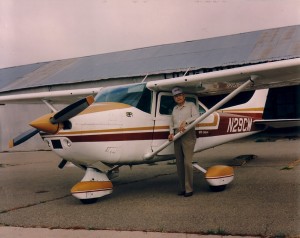
Cole Kugel with his Cessna 182; its call letters, two-nine Charlie Mike, actually stand for Cole and Mildred.
However, Kugel eventually did sell his Cessna 182, to Lynn Ferguson, a Longmont veterinarian and grandson of Kugel’s flying farmer friend Lee Hagemeister. But Ferguson had to promise that Kugel could take the plane out on his birthday, a five-year habit. Kugel picked up the idea from Harry J. Liggett.
“Harry didn’t start flying until he was 60 years old and he was 97 when he died. For a long stretch there, he’d go out on his birthday and he would fly. I thought, ‘Gee, that’s quite a stunt. I think I’ll do that, too,'” said Kugel.
Ferguson, who was in the cockpit for Kugel’s birthday flight, reports all went well.
“He did a great takeoff and then he came back and waved his wings at everyone on the ground,” he said. “He wanted to look at his farm, so out we went to Platteville. The landing is usually the hardest part. Most of us, if it’s been a few months since we’ve been in the cockpit, are a little bit nervous about it and don’t do that good a job. He brought that thing in perfectly and didn’t even sweat about it.”
Kugel agrees that he made a good landing that day.
“Didn’t bobble it a bit,” he said. Although he has finally let his pilot’s license expire due to some retinal damage in one eye, his airman’s license lasts a lifetime. As long as he has qualified company, Cole Kugel can fly.
Less than a month after his birthday, he was co-piloting the Cessna along with Ferguson over the skies of Wyoming to check on what was once Lee Hagemeister’s ranch. Along the way, Kugel got the notion to visit some Flying Farmer friends 20 miles west of Laramie Peak.
“I asked Cole if he remembered where they lived. Sure enough, there it was. He flew right to it. We went over and buzzed their house,” said Ferguson. Eventually the pilots met up on a small grass landing strip. “They shooed the cows off the runway and we swooped in there for a visit, then off we went again.”
Ferguson says that Kugel’s perseverance and tenacity for life is something he and other pilots admire.
“He’s a real example down at the airport. We all hope we’re in as good a shape as Cole is, and we can still see and fly, when we’re older,” said Ferguson. “He’s just a good guy to be around. As a mentor, he’s a neat man to know for a lot of us down here at the airport.”
In May, Kugel and three friends flew to the four corners area to visit with friends from the United Flying Octogenarians, who are all pilots over 80 years in age. Howard Reid, a former United Airlines captain, was at the controls. Reid, Kugel, Delmar Lemons and Ed Beagle also toured Monument Valley.
As is evident, Kugel remains a busy man. Of course, people often ask his secret to longevity.
“Just keep breathing,” said Kugel wryly.
Kugel, whose positive attitude is infectious, talks about his plans for the day and for the future. He’s always ready for whatever comes next.
“It’s what’s ahead that you have to look forward to,” he says. “Don’t look back. What’s gone by has already gone by.”
And just what is in Kugel’s future?
“When next year comes around, I may take another ride—if I’m up to it,” says the spry 100-year-old pilot.











